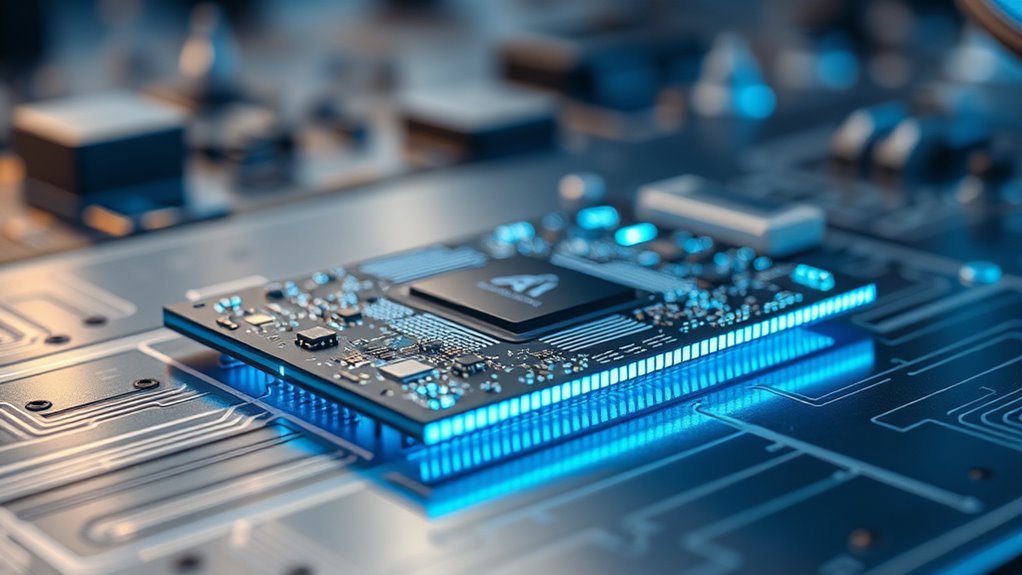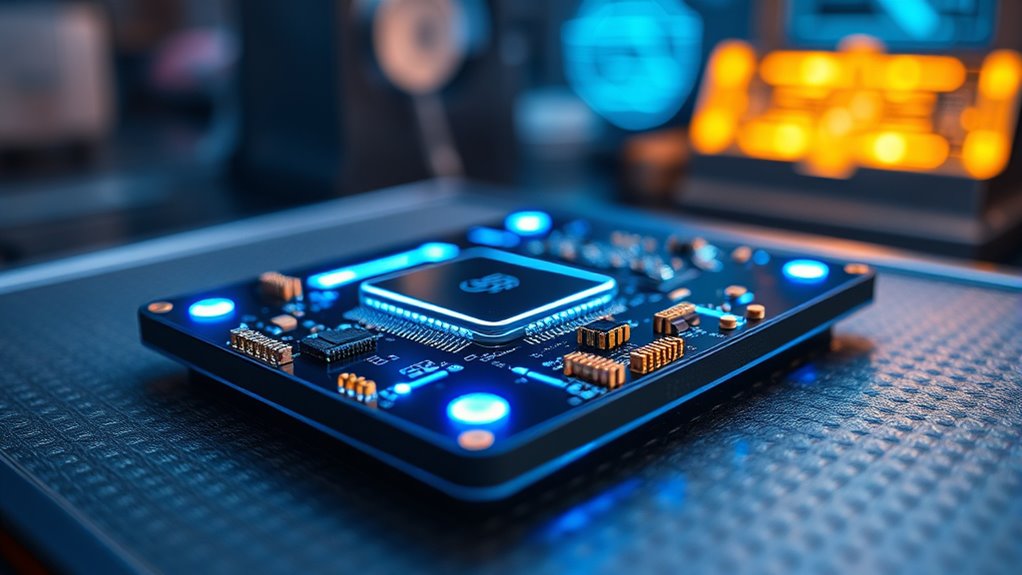By 2025, innovative chips like quantum and neuromorphic processors will transform AI capabilities. Quantum chips promise faster processing for complex tasks and breakthroughs in research, while neuromorphic chips mimic brain functions for more efficient and human-like learning. These advancements will lead to smarter, more adaptive AI systems, powering everything from virtual assistants to autonomous vehicles. As hardware continues to evolve, you’ll see remarkable progress—stay tuned to discover how these innovations shape the future.
Key Takeaways
- Quantum computing chips will dramatically enhance AI processing capabilities by 2025, enabling faster and more complex computations.
- Neuromorphic chips will mimic brain-like structures, improving AI’s efficiency, real-time learning, and decision-making.
- Advancements in hardware will lead to smarter, energy-efficient AI systems for autonomous vehicles, robotics, and virtual assistants.
- Emerging chip technologies will overcome classical hardware limitations, unlocking new AI research and application potentials.
- Continued innovation in AI hardware will fundamentally transform AI capabilities and drive breakthroughs by 2025.

Have you ever wondered what powers the incredible advancements in artificial intelligence? The answer lies in the innovative hardware behind the scenes, especially the chips designed to handle complex processing tasks. As we approach 2025, two technologies stand out for their potential to revolutionize AI hardware: quantum computing and neuromorphic architecture. These cutting-edge approaches are pushing the boundaries of what chips can do, enabling faster, more efficient, and smarter AI systems.
Quantum computing chips, though still in early stages, promise a leap in processing power. Unlike traditional silicon-based chips, quantum chips leverage the principles of quantum mechanics to perform calculations that would take classical computers an impractical amount of time. Imagine solving complex problems—like optimizing neural networks or simulating molecular interactions—much more quickly. This capability can dramatically accelerate AI development, especially in areas requiring immense computational resources. As researchers work on stabilizing qubits and scaling quantum processors, you’ll start to see their influence creeping into AI hardware, opening doors to breakthroughs previously thought impossible.
Quantum chips leverage quantum mechanics to vastly boost AI processing power and accelerate breakthroughs.
Meanwhile, neuromorphic architecture chips mimic the structure and functioning of biological brains. These chips are designed to process information more like neurons and synapses, enabling them to learn and adapt in real time. Instead of relying on traditional algorithms, neuromorphic chips utilize event-driven processing, which consumes less power and reduces latency. This makes them ideal for applications where speed and energy efficiency are critical, such as autonomous vehicles, robotics, or real-time data analysis. As you interact with AI-powered devices, many of them may soon incorporate neuromorphic chips that allow for more natural, human-like learning and decision-making processes.
Both quantum computing and neuromorphic architecture are transforming the landscape of AI chips by addressing key limitations of current hardware. Quantum chips can handle tasks that are computationally infeasible for classical processors, while neuromorphic chips excel at mimicking the brain’s efficiency and adaptability. These advancements mean that AI systems will become faster, more capable, and more energy-efficient. For you, it could translate into smarter virtual assistants, safer autonomous vehicles, and more personalized experiences.
As these technologies mature, expect to see hardware that’s not just faster but fundamentally different from what’s available today. Quantum computing will unlock new heights of problem-solving, and neuromorphic chips will bring AI closer to human-like cognition. You’re at the cusp of an era where hardware innovation fuels the next wave of AI breakthroughs, transforming the way machines learn, adapt, and assist in your daily life. Ongoing research in AI hardware continues to push these boundaries, promising even more revolutionary developments in the near future.
Frequently Asked Questions
What Are the Environmental Impacts of AI Chip Manufacturing?
You should know that AI chip manufacturing impacts the environment through high resource consumption and energy use. It can lead to e-waste and pollution if not managed properly. However, adopting sustainable manufacturing practices helps reduce these effects. By focusing on efficient resource use, recycling, and cleaner energy sources, you can minimize the environmental footprint of AI chips and promote more eco-friendly innovation.
How Do AI Chips Differ From Traditional Computer Processors?
AI chips differ from traditional processors because they’re optimized for neural networks and machine learning tasks, enabling faster data processing. Unlike CPUs, AI chips often incorporate specialized architecture, like tensor cores, to accelerate AI workloads. They’re also evolving towards quantum computing integration, which promises even greater performance. This specialization allows AI chips to handle complex algorithms more efficiently, fueling innovation across industries and advancing capabilities beyond what traditional processors can achieve.
What Are the Major Challenges in AI Chip Design?
You face major challenges in AI chip design, especially when optimizing neural networks for speed and efficiency. Balancing power consumption with performance is tough, and integrating quantum computing elements adds complexity. You must also guarantee chips can handle diverse AI workloads without overheating. Innovating in architecture and materials helps, but designing chips that seamlessly support evolving neural network models remains a key hurdle.
How Will AI Chips Influence Global Technology Markets?
AI chips will considerably influence global markets by boosting processing speeds and efficiency, enabling advancements in quantum computing and software optimization. You’ll see new opportunities for innovation, as industries adopt these powerful chips for smarter applications. This growth could reshape tech landscapes, creating competitive advantages and driving economic expansion. Your investments and strategies must adapt to leverage AI chip progress, ensuring you stay ahead in this rapidly evolving technological environment.
What Are the Ethical Considerations in AI Hardware Development?
You might think ethics are the last thing on AI hardware developers’ minds, but think again. You need to contemplate AI bias and privacy concerns, which are ironically overlooked in pursuit of innovation. As you create powerful chips, remember that biases can be embedded and privacy can be compromised. Your responsibility is to prioritize transparency, fairness, and user rights, ensuring your tech benefits everyone—not just advancing the latest hardware.
Conclusion
As you peer into 2025, think of these chips as the architects of a digital Renaissance, quietly fueling breakthroughs like a master painter’s brushstroke. Just as Da Vinci envisioned future worlds, these innovations shape the AI landscape, turning abstract ideas into tangible realities. With each new chip, you’re witnessing the dawn of a creative revolution—where hardware becomes the brush, and your imagination, the canvas. The future is crafted one circuit at a time.










